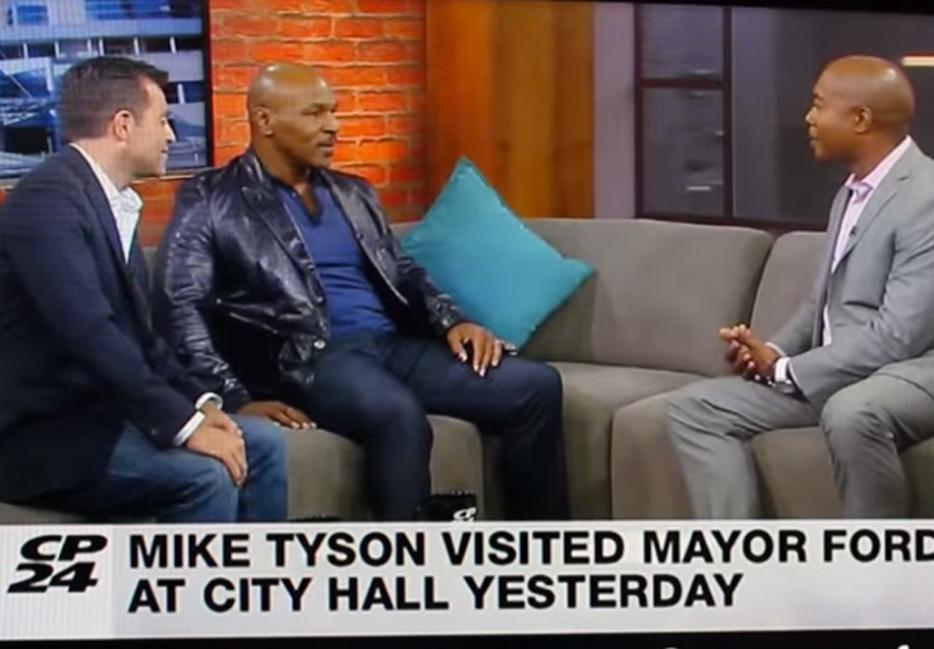There’s something decidedly off about CP24 reporter Nathan Downer apologizing to Mike Tyson after the boxer’s recentlive-on-air tirade. The mildly cynical among us might suggest that any reporter who hopes to book another celebrity (or, at least, pseudo-celebrity/reliable freak show) has to come out of that angry exchange looking as innocent as possible, even downright surprised that a man whose notoriety depends chiefly on his penchant for untethered behaviour might go off the chain when you bring up his criminal past. As usual, though, mild cynicism’s lack of conviction renders it shortsighted and pedantic.
Because it’s not just Tyson’s people who took issue with Downer's line of questioning. Plenty of—and I’m just speculating here—people who have to keep their PINs written on the back of their debit cards suggested there was something inappropriate with calling a convicted rapist such, at least in the context of a daytime television interview. Anyone with an interest in rehabilitation or grace would probably agree that Tyson may not deserve the full Larry Kleist, but having to have conversations on other people’s terms seems like a reasonable legacy for someone carrying such a criminal conviction, especially when you’re promoting a show in which you fairly strongly imply that you were falsely convicted due to personal and political animus. It’s not like Desiree Washington was a surprise guest; it was a question about how his past might colour his present behaviour.
But before we nod our heads too vigorously in defense of the journalistic impulses of a guy who conducts his interviews from a couch, it’s worth noting that the reason people had the opposite response was because Downer basically did break the rules of these kind of interactions, dumb as they may ultimately be. There is an unspoken—though not if your PR team has its shit together—compact that keeps television news as a kind of chummy stenography (at least when it’s not encouraging people with wildly incompatible views to angrily dismiss each other). You see it fairly acutely in the way celebrities respond to these things going pear-shaped (not that Tyson needs to, of course; pear-shaped is the brand there): where a print quote might just get the usual "taken out of context," in the situations where we can see the context with our own eyes, it's a "gotcha" reporter, someone being unfairly provocative through the fluff. That we sometimes swallow and regurgitate this argument ourselves feels like subconscious proof that if we wanted things to get dark and invasive, we would turn to the ghostwritten memoir, thank you very much; TV interviews are supposed to let us see how thoughtful and human everyone is, as evidenced by their ability to sit under soft lights and sip coffee and say thank you. They're just like us!
Though this tendency is the default mode of most kinds of celebrity journalism—a case of reporters wanting to bask in reflected glory rather than shine the light themselves—the bigger problem is that, absent a few choice do-goodery public outlets and the odd shaky-cam "investigation" into someone we've never heard of, television extends this cordiality and deference to virtually everybody. CP24, Downer's outlet, has previously been in the meta-news for anchor Stephen LeDrew's impressive ability to swallow the entirety of the Ford family from toes to hips; further afield, people with direct stakes in defense contractors are free to bang war drums with no requirement to disclose their ties.
And these are just immediately proximate examples—it might actually be easier to just identify the networks and shows that have not reduced guest appearances to Oprah-inflected chats. (Though perhaps that's unfair to Oprah, who does at least occasionally press the people who show up for weepy, face-saving tell-alls.)
That television news might be occasionally superficial is not new, of course, but even this isn't so much about being shallow as being absent altogether, existing only to provide the screen for others to fill. Once upon a time, our TV hosts might have gone looking to provoke an outburst, a cheap but compelling way to get at some kind of truth about the subject. Now, though, they're not even doing that much, just listening in on the assumption that what we're being told is as much as we need to know. Mike Tyson had two shows in Toronto last week; it's just that one of them accidentally wasn't a one-man version.






